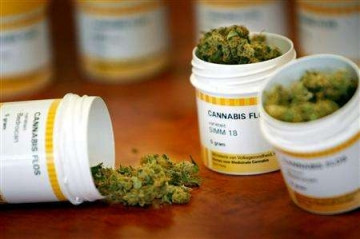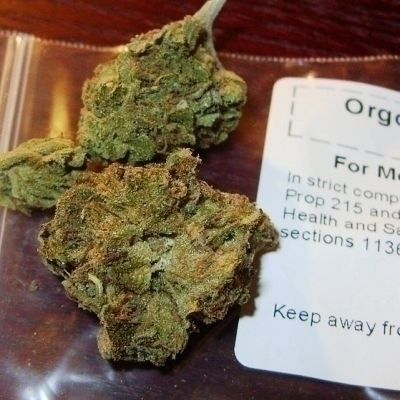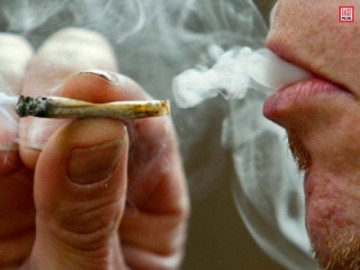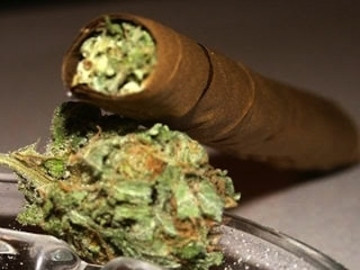Will New Findings on Marijuana Dangers Hurt Legalization Efforts?
Monday, April 21, 2014
There is now evidence that marijuana use may be more harmful than originally thought, especially in the adolescent brain.
Researchers from Harvard and Massachusetts General Hospital conducted a study where they took 40 adolescents aged 18-25 and performed brain scans to determine whether or not marijuana usage was affecting their brain.
Results show that the group that reportedly smoked pot at least once a week – the average use for this group was 11 joints per week – had more brain abnormalities in areas of the brain that affect functions like emotion, motivation, and decision making than the group that reportedly smoked marijuana less than five times in their lives.
GET THE LATEST BREAKING NEWS HERE -- SIGN UP FOR GOLOCAL FREE DAILY EBLAST“The brain abnormalities are an association between two variables,” said Dr. Ruben Baler, a neuroscientist with the National Institute on Drug Abuse (NIDA), which is one of the organizations that helped to fund the study. “It isn’t very surprising that something that you do would have an effect on your brain. This correlation shows that marijuana and THC can have an effect on the brain. What we have to do now is more research so that we can determine whether or not these abnormalities were a direct result of marijuana usage or if they were preexisting.”
Effects on the Young Mind
The pilot study may not have offered conclusive evidence as to whether or not marijuana usage has an effect on the adolescent brain, but it did mirror previous scientific hypotheses and support the notions brought forth in other studies.
Dr. Baler pointed to a previous study conducted in New Zealand where over 1,000 individuals were administered IQ tests at the age of 13 who were born in 1972 and 1973. Researchers assessed the individuals throughout their lives in terms of their marijuana habits and then retested their IQs at the age of 38.
Research found that individuals who used marijuana heavily throughout their teens and then continued to use into adulthood showed a significant drop in their IQ; marijuana users that could be described as having marijuana dependence noticed an average drop of eight IQ points.
“With this new study, there aren’t any concerns that we didn’t already have with the adolescent use of marijuana,” said Dr. Baler. “The young mind develops learning habits, motor skills, creation of new memories and a host of other things. These are all things that have the potential to be hijacked by the use of marijuana at an early age.”
Doctors who study brain function and adolescents fully admit that this most recent marijuana study does not offer conclusive evidence that marijuana has an effect on the young mind, but they admit that people should be concerned with the results presented by the study. Even if the results are only associations and not full blown conclusions, there are still red flags that are raised.
“Many people will be quick to point out that this study only offers associations, which is definitely true,” said Dr. Sharon Levy, director of the Adolescent Substance Abuse Program at Boston Children's Hospital. “An association never proves cause, but this study is particularly concerning because while it doesn’t prove that marijuana has an effect on the young mind, it certainly does nothing to disprove these effects.”
Dr. Levy says that the facts presented in the study warrant more attention and research because all of the marijuana studies are building on an underlying hypothesis that marijuana isn’t as benign as originally thought. With THC levels rising in marijuana, there should be a raised awareness in finding out whether these effects are real or not.
“THC is a neuroactive chemical and the amount that is currently in marijuana is more than the brain was designed to handle,” said Dr. Levy. “Just like marijuana, people used to think that tobacco was a benign substance. Tobacco was once considered a good tool for stress relief and it took a long time to get the message out that it was harmful to the body. I hope that people pay attention to studies like this because maybe marijuana isn’t as benign a substance as we had originally thought.”
A Better Market
Because of the brain abnormalities only being an association – it is impossible to determine whether or not they are a direct cause of marijuana usage – many are refuting the results of the study, pointing out that the associations made have no scientific groundings.
“I think that the first thing people need to do is take a step back and look at the limits of the study, said Jared Moffat, Director of Regulate Rhode Island. “It is a pretty small sample size and it uses brain scans which are snapshots of the brain. I think that this study is being blown out of proportion; it doesn’t mean that marijuana is creating impairment. The conclusions are not justified.”
Moffat states that it is very hard to determine behavioral outcomes by looking at brain scans alone. The study may show abnormalities in the brain in areas that effect motivation and decision making, but without other tests there is no way to know whether or not marijuana is affecting the adolescent brain or any behavioral outcomes.
Robert Capecchi, the Deputy Director of State Policy for Rhode Island for the Marijuana Policy Project, is another who has doubts about the study. Because of the study’s limitations and lack of control, it offers little help in determining marijuana’s effects on the adolescent brain.
“The control and the subject group were not well controlled,” said Capecchi. “There were significant age differences and the marijuana group admitted to drinking alcohol more than the control group. It states in the study that that they didn’t find a difference in brain functioning. This study is of note, but it doesn’t really tell us anything; more research needs to be done.”
Both marijuana advocates also call for the regulation and legalization of marijuana in the Ocean State which would help to create a better controlled and supervised market. While legalization wouldn’t apply to minors, it would still allow for more safety to those who choose to partake illegally.
“A reported 80 to 90-percent of high school children say that they have easy access to marijuana,” said Moffat. “Marijuana is something that is widely available in high schools and adolescents are smoking more than before. While still illegal for minors even if marijuana is legalized, the regulation of marijuana would allow for better controls to be put into place which wouldn’t make marijuana any more available for adolescents, but it would definitely make marijuana safer for those who choose to partake.”
Because the legality of marijuana isn’t a true deterrent for adolescents, Capecchi says that regulations to the marijuana market could help keep minors away from criminals and unregulated marijuana, which has the potential to be laced with other drugs.
“The criminal market is a terrible model for adolescents to get involved with; it puts them in direct contact,” said Capecchi. “If businesses were allowed to take control, there would be no need for criminal drug dealers. Adolescents are going to use whether or not marijuana is legal or regulated so wouldn’t it be better to know that marijuana has been tested and controlled? Not only that, if marijuana was being sold to minors by a business, we would have a better ability to track down who was selling it.”
Related Slideshow: Marijuana Use in the New England States
According to data collected by the Substance Abuse & Mental Health Services Administration, New Englanders are among the nation's top marijuana users in the country. See how the indivdual states compare in the slides below:
Related Articles
- Jared Moffat: Now is the Right Time for RI to Regulate Marijuana
- NEW: RI to Introduce Marijuana Regulation + Taxation Bill
- State Report: Marijuana Tax + Bill Targets Prostitutes and Pimps
- Legalized Marijuana in Jeopardy with Mattiello as Speaker
- New England States With The Highest Marijuana Arrest Rates
- The Highest Marijuana Prices in New England by State
- Legalized, Taxed Marijuana Would Generate .1% of RI Budget
- New Report: Legalized Marijuana Could Generate up to $82M for RI
- The Impact of Marijuana Legalization on RI’s College Campuses
- Marijuana Use in the New England States
- PODCAST: Are Medical Marijuana Users in RI Risking Their Jobs?
- Are Medical Marijuana Users in Rhode Island Risking Their Jobs?
- Will Rhode Island Be The Next State To Legalize Marijuana?
- PODCAST: Legalized, Taxed Marijuana Would Generate .1% of RI Budget
- Do You Favor Legalized Marijuana and Taxation in Rhode Island?
- NEW: New England NAACP Calls for Marijuana Legalization in RI
- PODCAST: The Highest Marijuana Prices in New England by State
- Guest MINDSETTERS™: A Sensible Marijuana Policy for Rhode Island
- NEW: Patrick Kennedy in the Middle of Super Bowl Marijuana Fight
- PODCAST: Will RI Be The Next State To Legalize Marijuana?
- In Case You Missed It: Highest Marijuana Prices in New England
- NEW: RI Legalization Bill Would Tax Marijuana Like Alcohol
- State Report: Marijuana Legalization Bill + Tax Hike Proposal
















